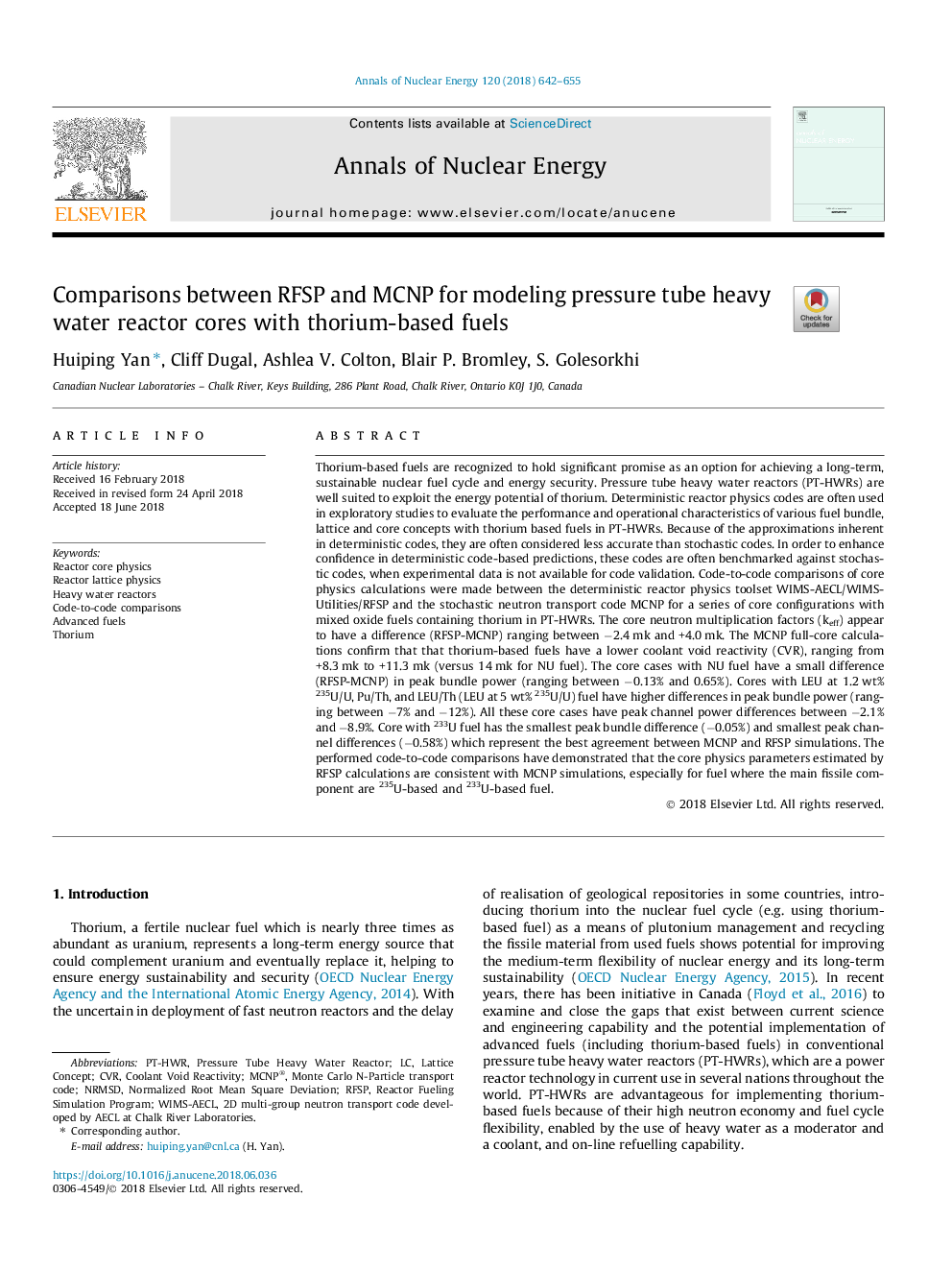| کد مقاله | کد نشریه | سال انتشار | مقاله انگلیسی | نسخه تمام متن |
|---|---|---|---|---|
| 8066875 | 1521076 | 2018 | 14 صفحه PDF | دانلود رایگان |
عنوان انگلیسی مقاله ISI
Comparisons between RFSP and MCNP for modeling pressure tube heavy water reactor cores with thorium-based fuels
دانلود مقاله + سفارش ترجمه
دانلود مقاله ISI انگلیسی
رایگان برای ایرانیان
موضوعات مرتبط
مهندسی و علوم پایه
مهندسی انرژی
مهندسی انرژی و فناوری های برق
پیش نمایش صفحه اول مقاله

چکیده انگلیسی
Thorium-based fuels are recognized to hold significant promise as an option for achieving a long-term, sustainable nuclear fuel cycle and energy security. Pressure tube heavy water reactors (PT-HWRs) are well suited to exploit the energy potential of thorium. Deterministic reactor physics codes are often used in exploratory studies to evaluate the performance and operational characteristics of various fuel bundle, lattice and core concepts with thorium based fuels in PT-HWRs. Because of the approximations inherent in deterministic codes, they are often considered less accurate than stochastic codes. In order to enhance confidence in deterministic code-based predictions, these codes are often benchmarked against stochastic codes, when experimental data is not available for code validation. Code-to-code comparisons of core physics calculations were made between the deterministic reactor physics toolset WIMS-AECL/WIMS-Utilities/RFSP and the stochastic neutron transport code MCNP for a series of core configurations with mixed oxide fuels containing thorium in PT-HWRs. The core neutron multiplication factors (keff) appear to have a difference (RFSP-MCNP) ranging between â2.4â¯mk and +4.0â¯mk. The MCNP full-core calculations confirm that that thorium-based fuels have a lower coolant void reactivity (CVR), ranging from +8.3â¯mk to +11.3â¯mk (versus 14â¯mk for NU fuel). The core cases with NU fuel have a small difference (RFSP-MCNP) in peak bundle power (ranging between â0.13% and 0.65%). Cores with LEU at 1.2â¯wt% 235U/U, Pu/Th, and LEU/Th (LEU at 5â¯wt% 235U/U) fuel have higher differences in peak bundle power (ranging between â7% and â12%). All these core cases have peak channel power differences between â2.1% and â8.9%. Core with 233U fuel has the smallest peak bundle difference (â0.05%) and smallest peak channel differences (â0.58%) which represent the best agreement between MCNP and RFSP simulations. The performed code-to-code comparisons have demonstrated that the core physics parameters estimated by RFSP calculations are consistent with MCNP simulations, especially for fuel where the main fissile component are 235U-based and 233U-based fuel.
ناشر
Database: Elsevier - ScienceDirect (ساینس دایرکت)
Journal: Annals of Nuclear Energy - Volume 120, October 2018, Pages 642-655
Journal: Annals of Nuclear Energy - Volume 120, October 2018, Pages 642-655
نویسندگان
Huiping Yan, Cliff Dugal, Ashlea V. Colton, Blair P. Bromley, S. Golesorkhi,